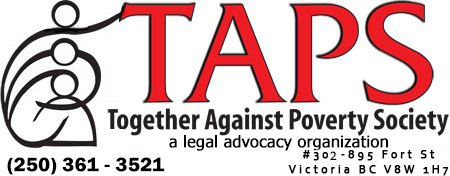Sharing Stories: TAPS – Income Assistance Advocacy
January 13, 2015 By Teresa Hartrick Comments are Off Sharing Stories
As part of our series on poverty and homelessness we asked people to consider sharing a story about their experiences. Sharing these stories serves as a reminder that poverty and homelessness are not a choice. It’s important for us to end the stigma and stereotypes that are too often associated with these issues. Each of us has followed a different path from the past to the present. Yet some of our paths have been rockier than others.
This week we are pleased to offer the fourth of these stories. We are grateful to Together Against Poverty Society (TAPS) for providing it to us. Assisting over 5,000 people in Victoria each year, TAPS provides free, face-to-face legal advocacy for people with income assistance, disability benefits and tenancy issues.
Income Assistance Advocacy Project Case Study
Sarah is a 21 year-old woman suffering from drug addiction, Post-Traumatic Stress Disorder and Schizophrenia. Since the birth of her son this year, she began attending peer counseling sessions and has managed to stay clean with support from friends and family.
Sarah’s best friend Tom has always been hugely supportive of her and her newborn son, despite having many challenges himself. The two decided to move in together, so that they can help each other out. After 6 months living together, the Ministry launched an investigation into the nature of their relationship, ultimately determining it is “marriage-like.” Sarah and Tom are required to apply for a joint client file; otherwise, Sarah will be found ineligible for income assistance and will owe the government a large debt.
Sarah and Tom have only ever been just friends. After living through three years of homelessness together they trust each other very strongly. Although their life together is different than most roommates, they certainly would never consider themselves spouses. They do not share a bedroom, or go on dates or share finances. Despite this evidence, the Ministry defines them as living in a marriage-like relationship pursuant to the legislation.
Sarah contacts TAPS. Her advocate prepares a submission, including letters from friends, family, and psychiatrists, appealing the Ministry’s decision. Despite this, the appeal is unsuccessful. On further appeal, the Employment and Assistance Appeal Tribunal upholds the Ministry’s decision that Sarah and Tom are in a marriage-like relationship.
Recognizing the unfairness of this, Sarah’s TAPS advocate contacts a pro-bono legal organization and lays out a case for judicial review of the decision. The Tribunal and Ministry agreed to a rehearing after learning of the impending judicial review. Ultimately the decision is overturned and Sarah and Tom happily live together once more!
* A total number of 2240 clients were helped by TAPS’ Income Assistance Advocacy Project in 2014 alone.
Comments are closed.
Latest Posts
Recent Comments
- Adeola on The Paris Agreement is in trouble: UNFCCC needs to ratchet up their climate efforts
- rory murphy on The Paris Agreement is in trouble: UNFCCC needs to ratchet up their climate efforts
- Andrew Weaver on How can BC’s environmental organizations be more effective?
- Andrew Weaver on How can BC’s environmental organizations be more effective?
- Vince Fiorito on How can BC’s environmental organizations be more effective?




